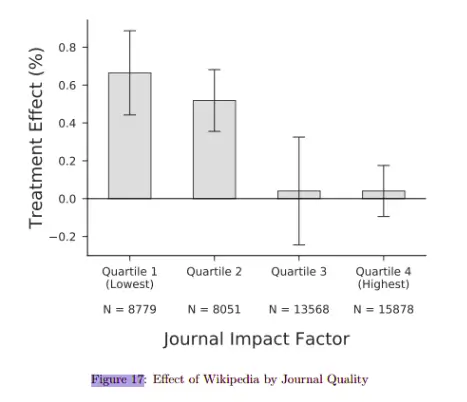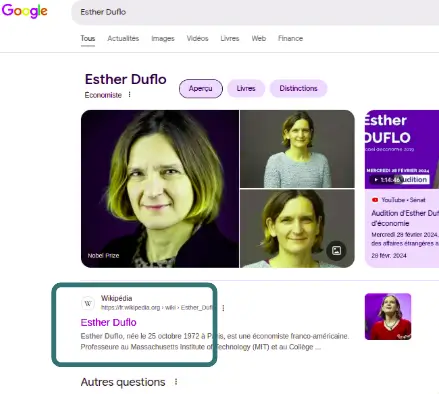Whether you’re a scholar in the private or public sector, independent or affiliated with a university, here’s how Wikipedia can be an opportunity for you.
You’ll learn why it’s relevant for scientists to pay attention to Wikipedia, when you can cite your own work on the platform, and even how you might qualify for your own page.
Institutional and private-sector scholars are among the professionals we regularly support at Wikiconsult. See our case studies in the scientific field.
Plan
Why Should Scholars Care About Wikipedia?
All else being equal, a scholar whose academic publication is cited as a source on Wikipedia is more likely to have their work cited in other publications [1].

Furthermore, the researcher’s Wikipedia page, if it exists, always appears in the top 3 search results when their name is typed, significantly increasing their visibility and credibility online.

Here are two concrete implications to draw from this:
- If you meet the eligibility criteria to be listed on Wikipedia, you should definitely have your own page.
- If you’re not eligible for a dedicated page, you can still add some of your publications as sources on relevant pages.
In both cases, it’s important to understand and follow Wikipedia’s contribution rules, particularly those related to conflicts of interest.
Can You Intervene to Cite Your Research Work on Wikipedia?
It is not forbidden to create or edit your own page on Wikipedia, although it is not recommended.
If you do so, the context of your contribution must be clearly disclosed on your user account or on the talk page of the page you are editing.
You must clearly state on whose behalf you are editing (including yourself), even if the compensation or benefit (including “symbolic” ones) is indirect.
✍️Need help making edits on Wikipedia?
We can answer your questions for free via email, or you can hire our services for personalized support on the encyclopedia. Take advantage of our 12+ years of experience on Wikipedia!
Can You Have Your Own Wikipedia Article as a Researcher?
To have your own dedicated page, you must meet the eligibility criteria defined by Wikipedia.
There are:
- General eligibility criteria, applicable to everyone;
- Specific eligibility criteria, depending on your field of activity.
Specific Criteria for Scholars and Academics
A list of specific notability criteria for Scholars is being developed. In the meantime, there are accepted specific criteria for academics (English Wikipedia):
- The person’s research has had a significant impact in their scholarly discipline, broadly construed, as demonstrated by independent reliable sources.
- The person has received a highly prestigious academic award or honor at a national or international level.
- The person has been an elected member of a highly selective and prestigious scholarly society or association (e.g., a National Academy of Sciences or the Royal Society) or a fellow of a major scholarly society which reserves fellow status as a highly selective honor (e.g., Fellow of the Institute of Electrical and Electronics Engineers or Honorary Fellow of the Institute of Physics).
- The person’s academic work has made a significant impact in the area of higher education, affecting a substantial number of academic institutions.
- The person has held a distinguished professor appointment at a major institution of higher education and research, a named chair appointment that indicates a comparable level of achievement, or an equivalent position in countries where named chairs are uncommon.
- The person has held a highest-level elected or appointed administrative post at a major academic institution or major academic society.
- The person has had a substantial impact outside academia in their academic capacity.
- The person has been the head or chief editor of a major, well-established academic journal in their subject area.
🚨 Having a high impact factor or speaking at numerous roundtables and conferences, including internationally, is not enough to be eligible, as this is considered common for a scholar.
General Criteria
Don’t meet the specific criteria? You might still have a page if you meet the general criteria.
Here are the general criteria for Wikipedia:
A topic is presumed to be suitable for a stand-alone article or list when it has received significant coverage in reliable sources that are independent of the subject.
What does that mean in practice?
- At least 2 media publications;
- Spaced at least 2 years apart;
- That focus exclusively on you;
- In well-known national media (not local daily press or specialized press);
- That are not copy-pastes of press releases or sponsored articles.
You need to find these media publications, which will then be used to write the content of the article.
👀Check your eligibility on Wikipedia with a notability audit
Request a comprehensive audit from us to determine your eligibility on the encyclopedia (delivered within 48 hours) or learn about alternative options that may be more relevant for your situation.
Such a Scholar Has a Page: Why Not Me?
While browsing Wikipedia pages of scholar, you may come across some who don’t meet these eligibility criteria. The main explanation is that the page was created over 10 years ago, at a time when Wikipedia was less strict about these notability guidelines.
These pages can be deleted at any time – this happens every day. Nowadays, it is almost impossible to bypass the system and create a page without strictly following these criteria.
What Should a Scholar’s Wikipedia Page Contain?
To write your Wikipedia biography, I recommend looking at featured articles on Wikipedia. For example, the one dedicated to James E. Boyd, physicist and mathematician.
Typically, your page will include:
- An infobox, with a free-licensed photo of you and concise information.
- An introduction summarizing the entire article in one to a few sentences, proportional to the length of the article.
- A Biography section, possibly divided into subsections (youth and education, career, personal life, etc.).
- A section on your Role in the history of science, if relevant.
- A section on Honors, if applicable.
- A Bibliography section, if applicable.
- A link to your professional website or that of your lab or university.
- The addition of categories and portals, especially related to the history of science or your field (sociology, mathematics, etc.).
Delegate the creation of your Wikipedia page
This is a service we offer after a reputation audit.

How to Train Yourself on Wikipedia?
It is often difficult to edit on Wikipedia for the first time. While there are many freely available online resources, getting the hang of the encyclopedia can be challenging.
In-person or remote training sessions are regularly offered, even within research labs, often by wikipedian in residence. University library documentalists sometimes also offer this type of service.
You can also explore our free resources on Wikiconsult.
🤓Train your team to manage Wikipedia the right way
Hands-on workshops designed for communication, PR & marketing teams.
Delivered live online – build lasting in-house expertise.
Sources
[1] Thompson, Neil and Hanley, Douglas, Science Is Shaped by Wikipedia: Evidence From a Randomized Control Trial (February 13, 2018). MIT

Written by Albin Guillaud
A Wikipedia contributor since 2014, with Wikiconsult I support businesses, institutions, public figures, and agencies looking to create, update, or monitor their presence on Wikipedia.